I found how to make it
Ok, I had some problems asking how to make it, but thanks to https://code.activestate.com/recipes/580640-scrolling-frame-with-mouse-wheel-support/ I succeded in making the mousewheel work as I intended. If it can help, the example is here.
import tkinter as tk
from random import randint
# --- classes ---
try:
from Tkinter import Canvas, Frame
from ttk import Scrollbar
from Tkconstants import *
except ImportError:
from tkinter import Canvas, Frame
from tkinter.ttk import Scrollbar
from tkinter.constants import *
import platform
OS = platform.system()
class Mousewheel_Support(object):
# implemetation of singleton pattern
_instance = None
def __new__(cls, *args, **kwargs):
if not cls._instance:
cls._instance = object.__new__(cls)
return cls._instance
def __init__(self, root, horizontal_factor=2, vertical_factor=2):
self._active_area = None
if isinstance(horizontal_factor, int):
self.horizontal_factor = horizontal_factor
else:
raise Exception("Vertical factor must be an integer.")
if isinstance(vertical_factor, int):
self.vertical_factor = vertical_factor
else:
raise Exception("Horizontal factor must be an integer.")
if OS == "Linux":
root.bind_all('<4>', self._on_mousewheel, add='+')
root.bind_all('<5>', self._on_mousewheel, add='+')
else:
# Windows and MacOS
root.bind_all("<MouseWheel>", self._on_mousewheel, add='+')
def _on_mousewheel(self, event):
if self._active_area:
self._active_area.onMouseWheel(event)
def _mousewheel_bind(self, widget):
self._active_area = widget
def _mousewheel_unbind(self):
self._active_area = None
def add_support_to(self, widget=None, xscrollbar=None, yscrollbar=None, what="units", horizontal_factor=None, vertical_factor=None):
if xscrollbar is None and yscrollbar is None:
return
if xscrollbar is not None:
horizontal_factor = horizontal_factor or self.horizontal_factor
xscrollbar.onMouseWheel = self._make_mouse_wheel_handler(widget, 'x', self.horizontal_factor, what)
xscrollbar.bind('<Enter>', lambda event, scrollbar=xscrollbar: self._mousewheel_bind(scrollbar))
xscrollbar.bind('<Leave>', lambda event: self._mousewheel_unbind())
if yscrollbar is not None:
vertical_factor = vertical_factor or self.vertical_factor
yscrollbar.onMouseWheel = self._make_mouse_wheel_handler(widget, 'y', self.vertical_factor, what)
yscrollbar.bind('<Enter>', lambda event, scrollbar=yscrollbar: self._mousewheel_bind(scrollbar))
yscrollbar.bind('<Leave>', lambda event: self._mousewheel_unbind())
main_scrollbar = yscrollbar if yscrollbar is not None else xscrollbar
if widget is not None:
if isinstance(widget, list) or isinstance(widget, tuple):
list_of_widgets = widget
for widget in list_of_widgets:
widget.bind('<Enter>', lambda event: self._mousewheel_bind(widget))
widget.bind('<Leave>', lambda event: self._mousewheel_unbind())
widget.onMouseWheel = main_scrollbar.onMouseWheel
else:
widget.bind('<Enter>', lambda event: self._mousewheel_bind(widget))
widget.bind('<Leave>', lambda event: self._mousewheel_unbind())
widget.onMouseWheel = main_scrollbar.onMouseWheel
@staticmethod
def _make_mouse_wheel_handler(widget, orient, factor=1, what="units"):
view_command = getattr(widget, orient + 'view')
if OS == 'Linux':
def onMouseWheel(event):
if event.num == 4:
view_command("scroll", (-1) * factor, what)
elif event.num == 5:
view_command("scroll", factor, what)
elif OS == 'Windows':
def onMouseWheel(event):
view_command("scroll", (-1) * int((event.delta / 120) * factor), what)
elif OS == 'Darwin':
def onMouseWheel(event):
view_command("scroll", event.delta, what)
return onMouseWheel
class Scrolling_Area(Frame, object):
def __init__(self, master, width=None, anchor=N, height=None, mousewheel_speed=2, scroll_horizontally=True, xscrollbar=None, scroll_vertically=True, yscrollbar=None, background=None, inner_frame=Frame, **kw):
Frame.__init__(self, master, class_="Scrolling_Area", background=background)
self.grid_columnconfigure(0, weight=1)
self.grid_rowconfigure(0, weight=1)
self._width = width
self._height = height
self.canvas = Canvas(self, background=background, highlightthickness=0, width=width, height=height)
self.canvas.grid(row=0, column=0, sticky=N + E + W + S)
if scroll_vertically:
if yscrollbar is not None:
self.yscrollbar = yscrollbar
else:
self.yscrollbar = Scrollbar(self, orient=VERTICAL)
self.yscrollbar.grid(row=0, column=1, sticky=N + S)
self.canvas.configure(yscrollcommand=self.yscrollbar.set)
self.yscrollbar['command'] = self.canvas.yview
else:
self.yscrollbar = None
if scroll_horizontally:
if xscrollbar is not None:
self.xscrollbar = xscrollbar
else:
self.xscrollbar = Scrollbar(self, orient=HORIZONTAL)
self.xscrollbar.grid(row=1, column=0, sticky=E + W)
self.canvas.configure(xscrollcommand=self.xscrollbar.set)
self.xscrollbar['command'] = self.canvas.xview
else:
self.xscrollbar = None
self.rowconfigure(0, weight=1)
self.columnconfigure(0, weight=1)
self.innerframe = inner_frame(self.canvas, **kw)
self.innerframe.pack(anchor=anchor)
self.canvas.create_window(0, 0, window=self.innerframe, anchor='nw', tags="inner_frame")
self.canvas.bind('<Configure>', self._on_canvas_configure)
Mousewheel_Support(self).add_support_to(self.canvas, xscrollbar=self.xscrollbar, yscrollbar=self.yscrollbar)
@property
def width(self):
return self.canvas.winfo_width()
@width.setter
def width(self, width):
self.canvas.configure(width=width)
@property
def height(self):
return self.canvas.winfo_height()
@height.setter
def height(self, height):
self.canvas.configure(height=height)
def set_size(self, width, height):
self.canvas.configure(width=width, height=height)
def _on_canvas_configure(self, event):
width = max(self.innerframe.winfo_reqwidth(), event.width)
height = max(self.innerframe.winfo_reqheight(), event.height)
self.canvas.configure(scrollregion="0 0 %s %s" % (width, height))
self.canvas.itemconfigure("inner_frame", width=width, height=height)
def update_viewport(self):
self.update()
window_width = self.innerframe.winfo_reqwidth()
window_height = self.innerframe.winfo_reqheight()
if self._width is None:
canvas_width = window_width
else:
canvas_width = min(self._width, window_width)
if self._height is None:
canvas_height = window_height
else:
canvas_height = min(self._height, window_height)
self.canvas.configure(scrollregion="0 0 %s %s" % (window_width, window_height), width=canvas_width, height=canvas_height)
self.canvas.itemconfigure("inner_frame", width=window_width, height=window_height)
class Question:
def __init__(self, parent, question, answer):
self.parent = parent
self.question = question
self.answer = answer
self.create_widgets()
def get_input(self):
value = self.entry.get()
print('value:', value)
if value == self.answer:
print("Right it's " + self.answer)
self.label['text'] = self.question + "Right it's " + self.answer
else:
self.label['text'] = "Sorry, it was " + self.answer
def create_widgets(self):
self.labelframe = tk.LabelFrame(self.parent, text="Domanda:")
self.labelframe.pack(fill="both", expand=True)
self.label = tk.Label(self.labelframe, text=self.question)
self.label.pack(expand=True, fill='both')
self.entry = tk.Entry(self.labelframe)
self.entry.pack()
self.entry.bind("<Return>", lambda x: self.get_input())
# self.button = tk.Button(self.labelframe, text="Click", command=self.get_input)
# self.button.pack()
# --- main ---
root = tk.Tk()
root.title("Quiz")
root.geometry("400x300")
window = Scrolling_Area(root)
window.pack(expand=True, fill='both')
for i in range(10):
one = randint(1, 10)
two = randint(1, 10)
Question(window.innerframe, "How is the result of {} + {} ?".format(one, two), str(one + two))
domande = [("Qual è la prima leva del marketing mix? (prodotto o prezzo?", "prodotto")]
for d, r in domande:
Question(window.innerframe, d, r)
root.mainloop()
